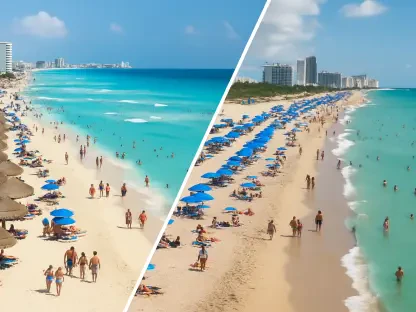Chicago’s dynamic short-term rental market is facing major changes as a new ordinance steps into the spotlight, aiming to reshape how properties listed on Airbnb operate. The initiative marks a concerted effort by city authorities to enhance transparency, accountability, and governance within the bustling short-term rental sector. As these regulations come into effect, they are set to tackle long-standing issues of oversight and clarity that have plagued both officials and neighborhoods. While this move targets more stringent control, it also opens a debate about the balance between regulation and economic freedom for property owners who capitalize on these rentals.
A Closer Look at the Transparency and Accountability Drive
The Rationale Behind Quarterly Reporting Requirements
A prominent feature of the new ordinance is the obligation for Airbnb hosts and property managers to submit detailed quarterly reports, providing data that had previously been elusive for city regulators. This requirement springs from a history where a lack of comprehensive information on rental locations and management identities hampered city oversight. The quarterly documentation mandate seeks to remedy this by obligating hosts to report comprehensive details, including registration numbers, nights rented, rental income, and taxes paid. This transparency is expected to illuminate the sector’s operations, offering a clearer picture that can guide regulatory decisions and address public concerns.
This systematic approach is designed to fill existing gaps in the city’s ability to manage the rapidly growing number of short-term rentals effectively. Offering a window into the financial operations of these rentals could also lead to a more equitable tax landscape, as accurate revenue accounts are necessary for proper taxation. By bringing this shadow economy into the light, the city hopes to create a more level playing field that does not unfairly benefit Airbnb hosts at the expense of traditional hospitality businesses or taxpayers. By fostering an environment where short-term rentals are as well-regulated as traditional lodging, Chicago seeks to reinforce its urban management strategy.
Addressing the Challenges in Regulating Short-Term Rentals
The democracy of short-term rentals is enticing to property owners seeking to extract higher revenues from their investments compared to long-term leasing options. This financial advantage is particularly pronounced in affluent neighborhoods like Lincoln Park, Gold Coast, and Lakeview, where the income generated from such rentals can help offset hefty real estate taxes. This dynamic means that property owners can sustain lower rent rates for their long-term tenants, thereby contributing positively to the housing market’s affordability. However, this potential windfall also underscores why regulation is essential, given the significant economic impact these rentals can have on local communities.
Another concern is the competition they pose to the hotel industry, which frequently lobbies against the increasing prevalence of Airbnb properties. Hotels argue for a level playing field, pointing out the tax discrepancies where Airbnb guests pay about 23 percent in taxes versus 17 percent for hotel patrons. By addressing these imbalances and ensuring all tax obligations are met, the city can better allocate resources for community needs and enhance public services. Ensuring fair competition among all hospitality providers encourages a richer, more diverse accommodation market for visitors and residents alike.
The Economic Impact of Airbnb on Neighborhoods
The Financial Dynamics and Community Implications
Short-term rentals offer compelling financial returns for property owners, often surpassing traditional rental income, which plays a critical role in sustaining neighborhood economies. In neighborhoods like Old Town and Lakeview, Airbnb revenues can be instrumental in counterbalancing high property taxes and maintenance costs, subsequently fostering rental rate stability for long-term tenants. This income flow not only supports the homeowners but can also invigorate local economies; as more tourists are drawn into diverse areas, other businesses benefit from increased foot traffic and customer spending. Restaurants, cafes, and shops in these areas can see notable improvements in revenue, fostering a vibrant local commerce scene.
This diverse economic impact highlights the value Airbnb brings to the broader Chicago landscape. Beyond hospitality, it helps disperse visitor spending throughout the city, rather than concentrating it in traditional tourist districts. By promoting neighborhood diversity and allowing visitors to experience Chicago’s varied communities, short-term rentals can foster cultural exchanges and enhance the city’s attractiveness as a travel destination. However, maintaining this benefit requires a careful balance, where the community gains without being compromised by the disruptions that an influx of temporary residents can occasionally cause.
Tension with Traditional Hospitality and Regulatory Balancing
The tension between traditional hospitality providers and Airbnb is ever-present due to differing tax and regulatory obligations. Hotels are subject to strict compliance requirements, whereas short-term rental services like Airbnb have operated with more leeway, causing friction in the hospitality market. The hotel industry’s lobbying for consistent regulatory frameworks underlines the necessity of equal competition, where each player adheres to similar standards and practices. The disparity primarily revolves around tax codes and operational transparency, areas where the new regulations aim for improvement.
The ordinance attempts to quell this discord by imposing higher taxes and fines for exceeding occupancy limits, maintaining order in residential areas. These measures are intended not just to protect traditional hospitality businesses but also to preserve the quality of life for local residents who may be affected by the increase in transitory populations. As the city implements these balanced approaches, it will need to continually assess and refine policies to accommodate both the innovative opportunities offered by Airbnb and the foundational services provided by conventional hotels. Achieving this harmony is essential for sustaining Chicago’s urban vitality and economic resilience.
Social and Regulatory Implications of Short-Term Rentals
Navigating Social Impact and Occupancy Regulations
Alongside economic considerations, the new rules introduce strict social and occupancy limitations to mitigate potential disruptions in residential neighborhoods. By capping maximum occupants at two per bedroom, excluding minors, the ordinance aims to regulate the volume of guests in residential buildings that might clash with community norms. Infractions involve heavy penalties, ranging from $5,000 to $10,000, which underscore the city’s commitment to maintaining order and addressing complaints about noise or overpopulation. This regulation is particularly crucial in densely populated areas of Chicago, where community harmony can be strained by frequent, unsupervised arrivals and departures.
These occupant caps work to minimize disturbances, ensuring that short-term rentals coexist peacefully with long-term residential living. For landlords and property managers, achieving compliance means not only adhering to the maximum occupancy rules but also cultivating a respectful relationship with neighbors and the broader community. This compromise seeks to preserve residential comfort while allowing homeowners to tap into the lucrative short-term rental market. As the city presses for enhanced accountability, it stimulates landlords to prioritize responsibility over mere profitability.
The Diverse Perspectives on Airbnb Operation
The perception of short-term rental operators as uniformly disruptive is increasingly being challenged. Experienced property managers advocate for a differentiated view, arguing that responsible operators adhere to high professional standards and actively engage with local standards and community relations. The new regulations recognize such distinctions, striving to balance the image of short-term rental providers with appropriate oversight measures. By acknowledging that the majority operate responsibly, the ordinance aims to foster a cooperative environment where hosts maintain good standing and contribute positively to their neighborhoods.
As short-term rentals continue to play a defining role in Chicago’s accommodation landscape, the responsibility rests on both legal structures and operators to adapt to evolving expectations. Maintaining high operational standards while adhering to legal requirements will determine whether these accommodations remain a sustainable choice for both tourists and the local populace. Chicago’s policy changes emphasize the necessity of this equilibrium, driving home the need for conscientious management in this ever-growing segment of the real estate market.
The Future of Short-Term Rentals in Chicago
Balancing Regulation with Economic Opportunity
The recent ordinance reflects Chicago’s strategic intent to balance stable community life with the financial perks presented by the short-term rental market. By enforcing transparency through detailed reporting and strict occupancy rules, the city seeks a refined regulatory framework ensuring coexistence between traditional housing options and new-age rentals. This dual approach not only seeks compliance but also champions economic harmony across various sectors, fortifying community resilience while safeguarding residents’ interests.
In the evolving landscape of urban management, these regulations represent a template for addressing modern housing challenges. By rooting regulations in accountability and economic fairness, Chicago demonstrates its commitment to adapting governance to contemporary urban dynamics. Authorities and property owners alike must work cohesively to uphold these standards, fostering a sustainable environment where economic and social objectives are harmonized for the city’s collective benefit.
Conclusion
Chicago’s vibrant short-term rental market is undergoing significant shifts due to a new ordinance aimed at revamping the operational landscape of Airbnb-listed properties. This development represents an intentional effort by city officials to bolster transparency, accountability, and governance in the thriving sector. As these new rules roll out, they intend to address persistent issues of control and clarity that have troubled both local authorities and communities for some time. Despite the emphasis on tighter regulation, this move has sparked a debate concerning the balance between regulation and economic autonomy for property owners who depend on these rentals for income. The initiative reflects ongoing tensions between fostering economic opportunities and ensuring community stability and oversight. While the ordinance seeks stricter management, the broader conversation about the implications for property owners persists, capturing the attention of stakeholders across the city.









